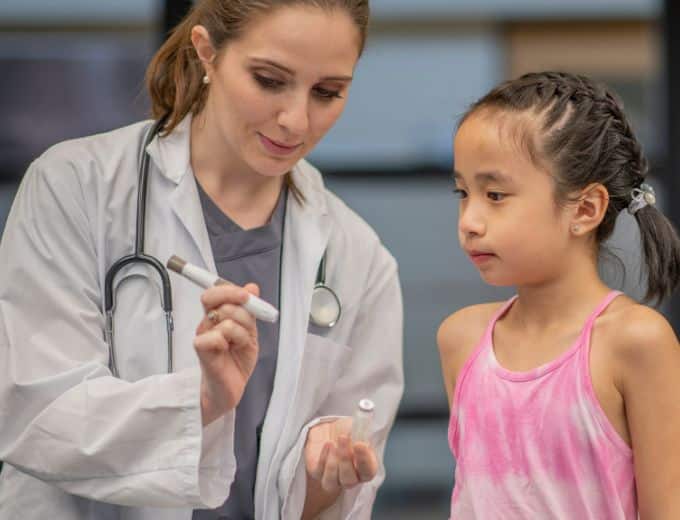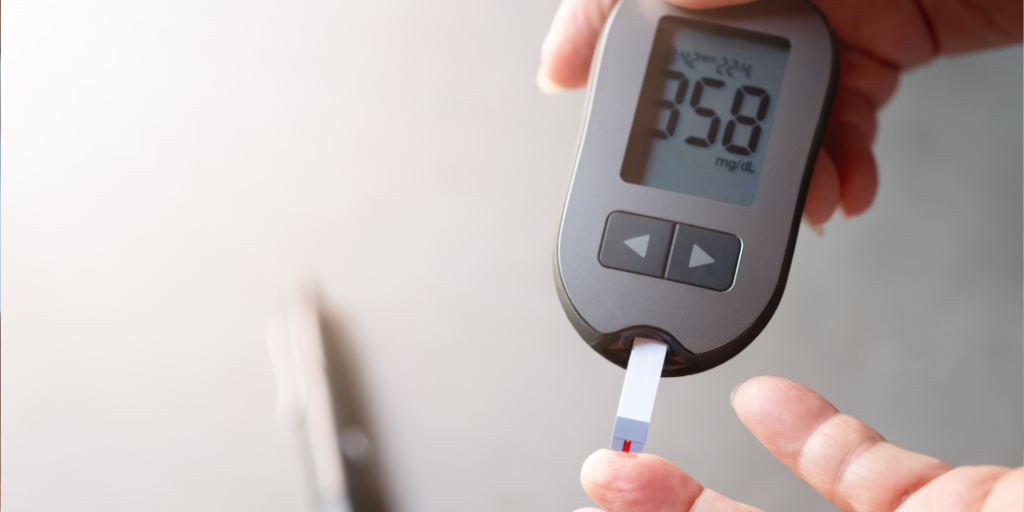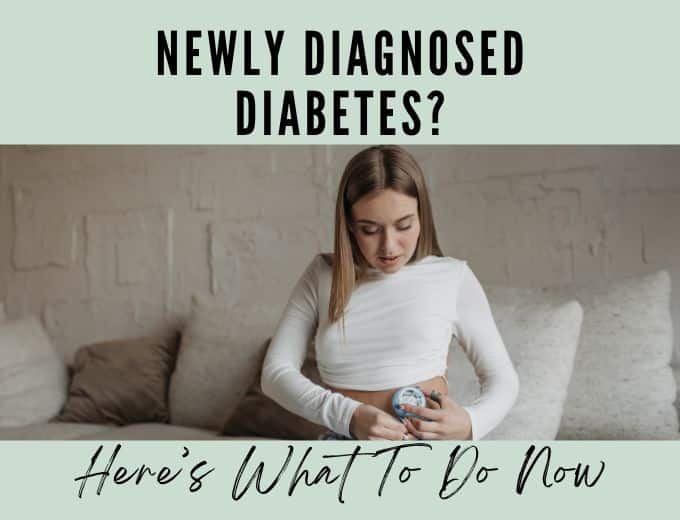Do you have newly diagnosed diabetes? It can be shocking, disappointing, or fearful news. But I want to make you feel at ease. Diabetes is a manageable condition! Here are some tips to get started.
A diabetes diagnosis can bring a flood of emotions. Denial, anger, regret, stress, hopelessness, and fear are just some of the NORMAL feelings you might experience. Even after you’ve processed the news, you’ll likely have some difficult emotions.
When you are first diagnosed with diabetes, many questions need answering. What can I eat? How do I check my blood sugar? Will I need to take insulin? Today, I want to discuss the first steps you’ll take when you are diagnosed with diabetes.

Get diabetes support
First, take a deep breath. I know your mind is in overdrive. But you’ve got this! You are not alone. Did you know that 37.3 million people in the U.S. have diabetes? That’s 1 in 10 people.
My advice to people who have been just diagnosed with diabetes is to find your tribe. You’ll need supportive people in your corner. Not people who are going to police your diet, but those who truly care for you.
Find a diabetes educator
As a diabetes educator, my favorite appointments are those first ones where I’m able to offer peace of mind in the midst of overwhelm. Find an educator, involve your family, and reach out to friends that have been there.

A diabetes educator will be able to answer all of your burning questions—and the ones you haven’t thought to ask. Topics you’ll likely cover include:
- Monitoring blood glucose
- Physical activity
- Troubleshooting blood sugar patterns
- Medications
- Managing stress
- Sick days
- Eating
- Sleep
- Reducing the risk of complications
Some diabetes educators are also dietitians, so they may be able to provide you with more comprehensive nutrition education.
Schedule follow-up
You’ll normally see your provider or other members of your diabetes care team within the first 6 weeks after you are diagnosed. Don’t worry, you won’t always have to go so frequently. When your blood sugars are well managed, appointments are typically scheduled every 3 months.
The first follow-up appointment is to review how your initial treatment is working. Maybe you’ll meet other members of the diabetes care team. Your provider will likely want to look at your blood sugar levels. This means you’ll need to monitor them at home.
Check your blood sugars

When you are diagnosed with diabetes, you’ll receive a prescription for testing supplies. This normally includes a meter (glucometer), test strips, a lancing device, and lancets. You may also receive alcohol swabs.
Another option for monitoring is a continuous glucose monitor (CGM). A continuous glucose monitor is a device that uses a sensor (most commonly placed on your arm) and provides real-time blood glucose levels.
Checking your blood sugar will be an important part of managing your diabetes. Blood sugar data provides information about how your body responds to food, exercise, and your medications. You and your diabetes care team can make treatment adjustments based on your numbers.
Call with questions

If your blood sugars have been over 200 mg/dL, under 70 mg/dL, or you are wondering about medication side effects, do not hesitate to call.
You don’t have to wait for your follow-up appointment. Your diabetes care team will be happy to answer questions.
Newly diagnosed diabetes FAQs
Will I have to go on insulin with newly diagnosed diabetes?
That depends. Type 1 diabetes requires insulin for survival. On the other hand, there are many other treatment options for those with type 2 diabetes—such as lifestyle interventions and oral medications.
If you’ve been diagnosed with gestational diabetes, you may be able to manage your blood sugars with lifestyle changes. However, some women find they need to take insulin in order to reach their blood sugar goals.
Can I be cured of newly diagnosed diabetes?
Unfortunately, there is no cure for type 1 diabetes at this time. Researchers are working at it. The good news is that you can manage it with insulin therapy.
Diabetes is considered a chronic disease that has to be managed for the rest of your life.
That said, type 2 diabetes can be sometimes reversed by alterations in lifestyle and weight loss (most often through weight loss surgery).
Before you jump into severe dieting in order to lose weight, please read this post. I outline the difficulty of weight loss and yo-yo dieting. While dieting often works for weight loss in the short-term, it’s actually more likely to cause weight rebounding.
Can I eat carbohydrates?
YES! In fact, you can eat all of the foods that you love. The key is mindfulness and paying attention to your body’s cues.
I usually recommend you start by ADDING in nutrient-packed foods rather than restricting any food groups.

Simple swaps can also be done with your diet so that it feels non-restrictive. I highly recommend meeting with a dietitian who will work with you and your personalized nutrition needs.
What is the target blood sugar range?
You’ll need to check your blood sugar to know if your levels are within target range. Your target may be individualized, depending on your own circumstances. The typical targets are as follows:
- Before a meal: 80-130 mg/dL
- 2 hours after a meal: <180 mg/dL
What’s a low blood sugar?
Any blood sugar level lower than 70 mg/dL is considered a low blood sugar, or hypoglycemia. You’ll want to eat 15 grams of simple carbohydrates to get your blood glucose back up.
Here are some foods/drinks that are 15 grams of carbs:
- 1 tube of glucose gel (good to have on hand in case of lows)
- 1 cup low-fat milk
- 3 glucose tablets
- 3 sugar packets
- 1 tablespoon sugar or honey
- 1/2 banana
- 1/2 cup soda or juice
What happens if I don’t manage my blood sugars?
Diabetes has to be taken seriously. Uncontrolled diabetes can lead to multiple complications over time. Chronically high blood sugar can result in heart disease, kidney disease, nerve damage, vision impairment, and poor circulation.
You are not alone
Please remember that you do not have to face diabetes alone. There are many online support communities and great diabetes specialists that can help you.
If you are looking for encouragement and the tools to manage your health, I’m here to help. I want to empower you to take the steps needed for optimal wellness. Book a free discovery call so we can see if your goals align with my services. I look forward to meeting you!
About the author
Erin is a registered dietitian and diabetes educator with almost 20 years of experience. She specializes in weight-inclusive diabetes care and prevention, intuitive eating, fitness, and women’s health. She works as a consultant and writer in the health and wellness space. Erin is passionate about empowering people to manage their own health and to have peace with food.


